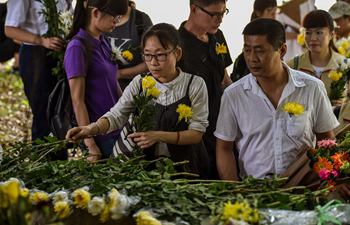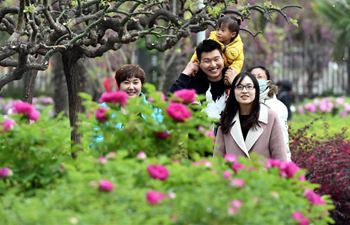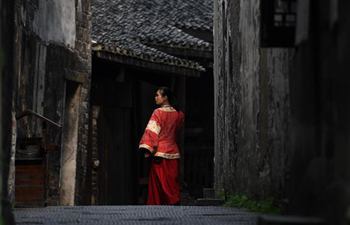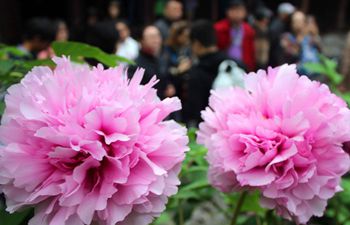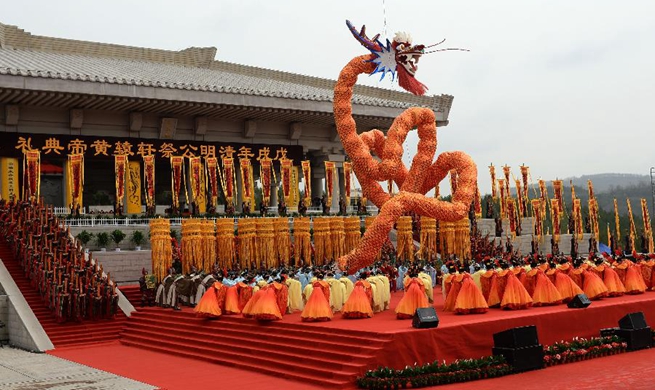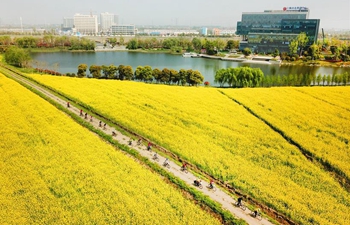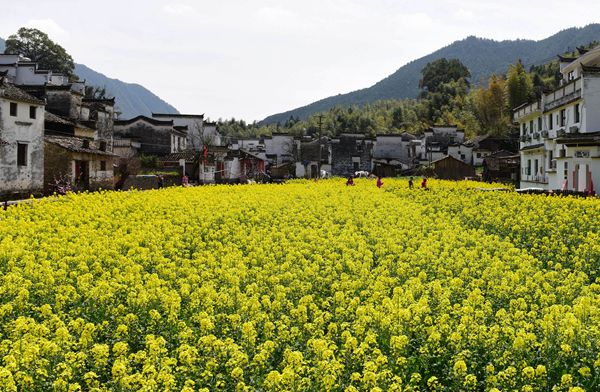
People view rapeseed flowers in Wuyuan, east China's Jiangxi Province, March 17, 2018. (Xinhua/Hu Dunhuang)
NANCHANG, April 5 (Xinhua) -- All of the 14 guestrooms at Edward Gawne's village inn in the Chinese countryside are booked a month in advance.
The 33-year-old British man runs an inn named Skywells in Wuyuan County, Jiangxi Province with his Chinese wife, Selina Liao Minxin.
"With the Tomb-Sweeping Day holiday, we receive more than 20 phone calls to make reservations or get directions every day," Gawne said.
The couple opened Skywells last August in a historic mansion that contains delicate woodcarvings, a western fireplace, a wooden bar as well as a small blackboard with a menu in both Chinese and English.
It is one of the over 4,000 historic houses in Wuyuan, an area famous for its fields of golden rapeseed flowers in spring. Most of the houses feature traditional Hui architecture, known for its gray tiles and white walls.
"Here we have green trees giving shade and a stream flowing beneath little bridges. Hui-style houses are beautiful, representing traditional Chinese culture," Gawne said.
Hui architecture is one of the major Chinese styles of architecture from ancient times and can be seen across the country in exquisite homes, ancestral halls and memorial archways.
The couple's 900-square-meter house, formerly named "Jinzhicheng Hall," was originally an inn for traveling merchants about 300 years ago. It was expanded around 150 years ago to include 14 bedrooms, a formal hall and a yard for animals, according to Gawne.
"A yard, a bar, a fireplace and a dog, I found everything I love about idyllic British life in Wuyuan," Gawne said.
Before settling in Wuyuan, Gawne worked in Shanghai and met his wife in 2013. The pair resigned from their jobs in 2015 saying they were "fed up with the rush of city life."
They returned to Liao's hometown Nanchang, capital of Jiangxi, and traveled around the province where Gawne was drawn to the old buildings in Wuyuan.
"It would be a pity if these exquisite old houses disappeared," Gawne said.
With the help of the local government, the couple bought a house built in Qing Dynasty (1644-1911) in Yan Village at the end of 2015.
"This house has seen the rise and fall of the Qing empire, and the Nationalists, Communists and modernity all flow past its front door," Gawne said.
At one point the house was home to a wealthy woman who took in orphans at the turn of the 20th century. More recently, it acted as an office for the village commune. Quotations from Chairman Mao's Little Red Book, meant to encourage the workers, still adorn the walls.
"We are preserving the stories of our house and the families who came before us," Liao said.
"Each room is named after a story of its previous owners to ensure the culture of this ancient building is passed down," she said. "We kept all the original early Qing dynasty architecture, woodcarvings and stone."
The couple are also writing their own stories in the house. Last May, they held their wedding ceremony in the Bao Jian Mountain Room.
Gawne replaced an old beam which had been destroyed by termites and invited renowned experts on Hui architecture to engrave love stories on a new beam.
The couple's hard work has been warmly received by villagers and visitors.
"The old building was about to collapse and I am very happy to see that it had been renovated in such a good way," said Hu Shengying, a previous owner of the house.
Skywells has been rated 9.8 out of 10 on Booking.com, a popular travel booking site.
"I really enjoyed my stay at Wuyuan Skywells. The house is beautiful and perfectly restored. I enjoyed the remoteness of the village and getting out into the countryside," commented Hannah, a traveller from Britain.
"The house features Hui-style architecture and is well-preserved. It combines modern elements with Chinese history and culture," commented a Chinese visitor surnamed Lei.





